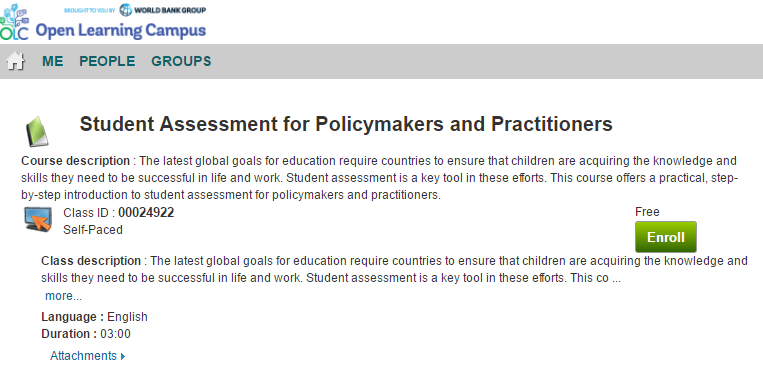
Assessments make a lot of people nervous, and I’m not just talking about the students who have to take them. As a psychometrician (assessment expert) and World Bank staffer, I’ve worked on assessment projects in more than 30 countries around the world over the past 10 years. Time and again, I’ve found great interest in student assessment as a tool for monitoring and supporting student learning coupled with great unease over how exactly to go about ‘doing’ an assessment.
This capacity gap needs to be filled -- now more than ever. The latest global goal for education requires countries to ensure that children are acquiring the knowledge and skills they need to be successful in life and work. Student assessment is a key tool in these efforts, but, as I’ve seen, many countries are ill-equipped to design the kinds of assessments needed to monitor and support this goal.
I’m excited therefore to share that we have just launched a new course in the World Bank’s Open Learning Campus on the topic of Student Assessment for Policymakers and Practitioners. This self-paced course, which is accessible to anyone anywhere in the world, represents the culmination of many months of curating a vast amount of information and resources on student assessment into a user-friendly instructional package. The result is a practical, step-by-step introduction to student assessment for policymakers and practitioners. In my view, one of the most important features of the course is that it does not assume prior knowledge on the part of the learner, but takes a gradual approach, first explaining what assessment is and why it is important, before delving deeper.
The target audience for the course is national policy-makers and practitioners who work directly or indirectly on issues of education quality, student learning, and student assessment as well as staff working in international development organizations.
The course is organized into three modules:
- Why invest in student assessment? This module provides an introduction to the topic and terminology of student assessment. It describes some of the pitfalls of assessments when done poorly, and some of the payoffs of assessment when done well.
- What matters in student assessment systems? The second module describes the key ingredients that go into effective assessment systems as well as some of the tools and resources that countries can use to evaluate and strengthen their assessment systems.
- How to design and implement student assessments? The last module explains how to make strategic tradeoffs among assessment options. It also outlines key issues and steps to consider when designing, implementing, or using data from classroom assessments, examinations, and large-scale assessments.
- Describe different types of student assessment activities, such as classroom assessments, public examinations, and large-scale assessments;
- Discuss what matters in student assessment systems;
- Identify tools for pinpointing strengths and areas for improvement in a student assessment system; and
- Understand how to design and implement student assessment activities.
Currently, the Student Assessment for Policymakers and Practitioners course is available in English, but there are plans to translate it into other languages. We invite you to check it out and let us know what you think!
Find out more about World Bank Group Education on our website and on Twitter.


Join the Conversation